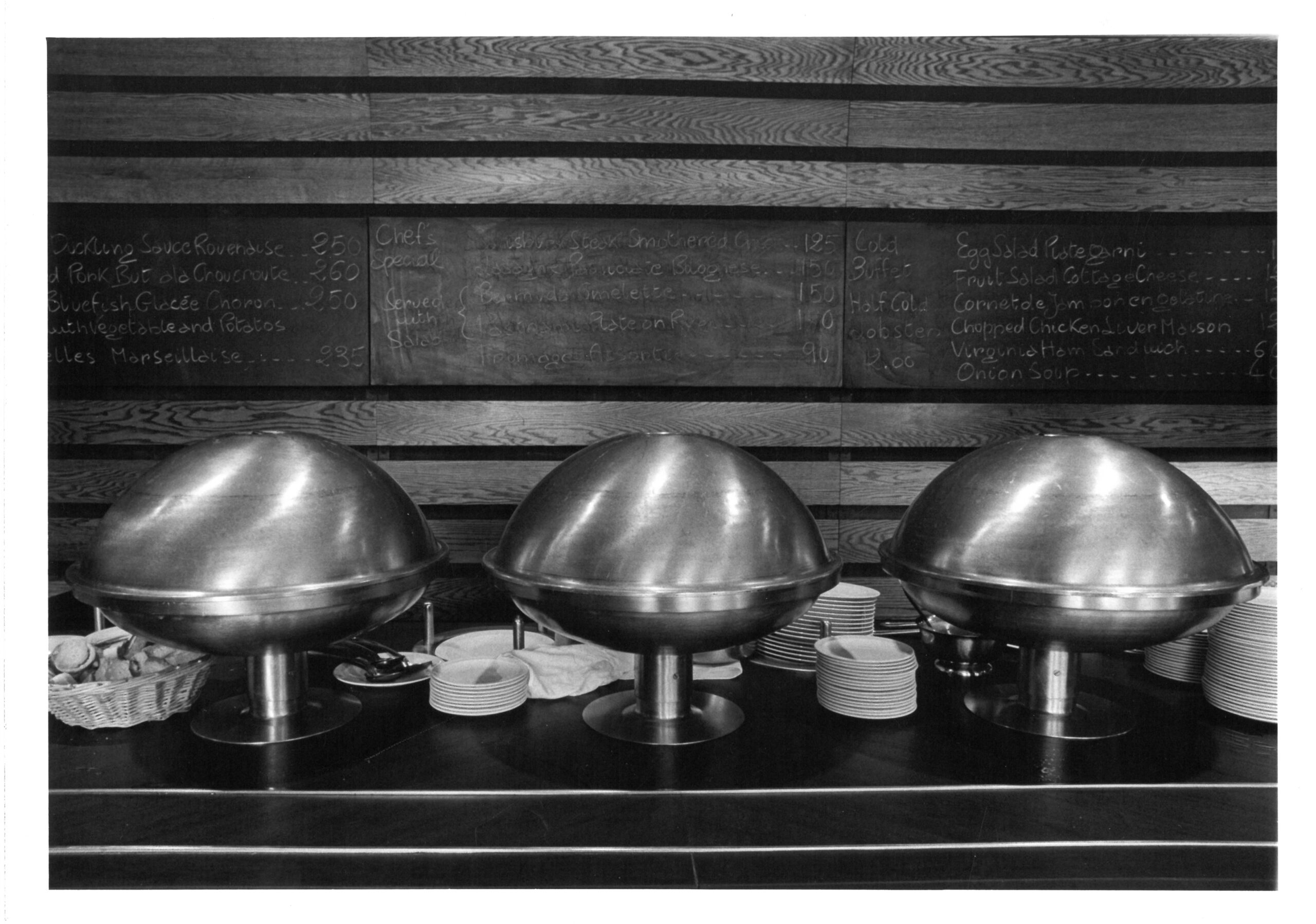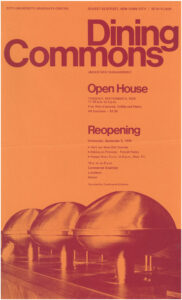by Lucia Dikaczova
Dining halls benefit members of college communities in a multitude of ways. Healthy, affordable, and sustainable food options nourish physical well-being, and the optimal set up of communal spaces provides opportunities to relax and connect with the environment and other members of the community. In many ways, dining halls are core to a college’s culture.
The Dining Commons at the Graduate Center has, since the 1970s, been a successful model. Materials from institutional archives held in the Graduate Center’s library include a New York Magazine review of the Dining Commons from May 21, 1971 when the Graduate Center was located on 42nd Street. The review notes that the Dining Commons was an “exceptionally well put together” place that “provides an extraordinary opportunity to dine well and relax in an out-of-the-ordinary comfortable environment within an acceptable price range, in a business area that isn’t particularly known for dispensing those amenities.” The Dining Commons stood out with affordable options and its remarkable ambiance. Even more, The GC’s Dining Commons was “probably the last refuge of the 10-cent cup of coffee” that could be found in Midtown Manhattan, and offered a menu broad enough to provide students with limited incomes nourishing meals during the day. Additional records in the form of visual posters retrieved from the archive show that the Dining Commons also provided space for a social hour, offering not just affordable food and coffee, but also lively cocktail parties with discounted drinks.

Photograph of the Dining Commons by Mark Krastof (Jan 1971).
Much has changed since the 1970s. In 1999 the Graduate Center moved to its current location on 34th Street, and until 2020 supported multiple spaces for community members to congregate and purchase food and refreshments: the Dining Commons on the 8th floor, and 365 Express on the ground level. Both spaces closed during the COVID-19 pandemic, and food service in the building has yet to resume.
As the Graduate Center’s leadership struggled to restore food service in the building, the Graduate Center community has been left without a reliable space to dine, connect, protest, and heal. In February 2023, a group of student government representatives from the Graduate Center chapter of PSC-CUNY, union members and volunteers organized the “Reclaim the Commons,” group. In January 2023, Reclaim the Commons launched the “People’s Pantry” which provides free, non-perishable foods and beverages to members of the community. The need for affordable food on the Graduate Center campus is clear: food prices in midtown have increased, and the People’s Pantry has worked hard to keep supplies on the shelf. The Peoples Pantry has been hosting dinners on Wednesday nights, serving hot meals prepared by volunteers. The “Reclaim the Commons” movement has faced resistance and pushback from the Graduate Center administration, confirming the Dining Commons’ role as a political space where the community’s voices can be heard.
The Graduate Center has been deprived of more than just affordable food options. Dining halls provide spaces where learning can continue beyond the walls of the classroom in informal ways. Dining halls are places within the institution where we get to know each other and where we can exchange our knowledge. Informal learning spaces, although still embedded within institutional spaces, allow for an exchange of knowledge, care and activism that is less burdened by formalities than spaces like classrooms or conference rooms. The Graduate Center has very few operational spaces where socialization and informal learning can take place. While remote learning remains popular and convenient, this form of learning can lead to feelings of isolation and disconnectedness from the broader community. As colleges gradually move towards new structures for teaching, learning, research, and service, they must address the growing need for re-conceptualized learning spaces that are favorable for sharing, informal learning, and connection.
Informal learning spaces provide an opportunity for student-centered learning and collective care, which are vital and necessary correctives to individualistic learning models. From a personal experience, I fondly recall being an undergraduate student and sharing conversations with my peers in the college dining area surrounded by the beauty of the gothic-like campus of City College. We formed friendships and exchanged knowledge in a manner that simply would not be possible in the classroom. Centers of communal life like the Dining Commons are vital for the health, well-being, and future of the community.
The transition of the Dining Commons provides an opportunity to envision a better future for the space. The mere reconstruction of the space according to the previous mode of operation may not be sufficient. The need of students to have a space where collective care and informal learning can happen must be met. Whether the Dining Commons will become such a space is contingent on whether the current college administration will take the necessary steps to address the pressing needs of the Graduate Center community. But whatever happens, please bring back the most affordable coffee in Midtown Manhattan.
Sources
Glaser, Milton, and Jerome Snider. “The Underground Gourmet: Un-Commons.” New York Magazine, 21 May 1971.
Nikolic, Nathan. “The People’s Pantry Is Open!” The Graduate Center Chapter of the Professional Staff Congress (PSC), 2 Feb. 2023, https://psccunygc.commons.gc.cuny.edu/2023/02/02/the-peoples-pantry-is-open/.
Wood, Olivia. “CUNY Administration Cracks down on Student and Worker-Run Food Pantry.” Left Voice, 19 Mar. 2023, https://www.leftvoice.org/cuny-administration-cracks-down-on-student-and-worker-run-food-pantry/.
Special thanks to Ana Badue, Molly Bauer, Pedro Cabello, and Roxanne Shirazi for collaborating on this project. The review, photographs, and other visual materials were retrieved from the Graduate Center Archives.
———-
Lucia Dikaczova is the Academic Program Officer for the Teaching and Learning Center and the Interactive Technology and Pedagogy Certificate program.











Leave a Reply